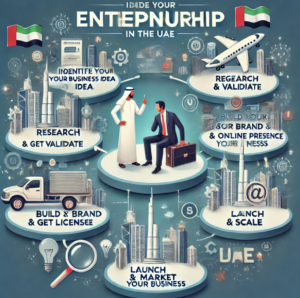Women and Entrepreneurs! Are you ready to turn your entrepreneurial dreams into reality in the UAE? Welcome to our blog, where we demystify the journey of starting your own business. From navigating the legal landscape to leveraging governmental support specifically designed for women-led startups, we provide you with detailed, step-by-step guidance to ensure your venture not only starts off on the right foot but thrives. Join us as we explore the exciting opportunities and resources available for female entrepreneurs in the UAE.

Process of Creating a New Venture for Entrepreneurs
Before diving into the main topics of our blog, we want to explain briefly the entrepreneurial process and the steps to create a new startup venture. These steps are universal and applicable to all startups and new ventures, whether you are launching a business in the UAE or any other part of the world. However, certain steps need to be adapted and modified to fit the unique context of the UAE. In this blog, we will focus exclusively on the steps that are specific to the unique context of the UAE. Here is the generalized process for creating a new entrepreneurial venture (the steps given in bold will be discussed in the rest of the blog):
- Opportunity search and identification: Finding an opportunity in the UAE Market
- Evaluation of opportunity: Feasibility Analysis
- Market Analysis and Competitor Analysis: Understanding the UAE Market
- Formation of Founding Teams
- Developing Business Model
- Legal Framework of the Venture: Business Licensing and Legal Requirements in UAE
- Developing Marketing Plan
- Financial Analysis of the Venture
- Developing Business Plan
- Acquiring Funds and Sources of Capital Funds: Funding opportunities for women in UAE
- Implementation and Managing Growth
Out of these 11 steps, we will particularly focus on i) opportunity search in UAE, ii) understanding the UAE consumer Market, iii) Licensing and legal requirements in UAE, and iv) funding opportunities for women in UAE. Understanding these four steps will help entrepreneurs launch their startups in the UAE.
Identifying the Ideal Business Opportunity in the UAE
The UAE is a place of opportunities, but not all business ideas will succeed here. The goal is to identify an opportunity that satisfies an actual requirement. Here’s how to identify an effective idea:
Search for Market Gaps: What is missing from the UAE? Are there particular goods that people struggle to find? Businesses that provide sustainable products, economical delivery services, and technology-driven solutions are in great demand.
Discover Government Initiatives: Programs such as Dubai Future Accelerator programs and Make It in the Emirates provide assistance to creative companies.
Participate in networking events. Conversations generate some of the best ideas. Join trade shows such as GITEX, Step Conference, and SME World Summit to network with industry leaders.
Explore our competitors: Consider what is already working and how you may improve on it. Your unique selling point (USP) will allow you to stand out.

Understanding the UAE Consumer Market
The consumer market in the UAE is a lively, multicultural center with distinctive opportunities and difficulties. Accordingly, to customize goods and services and encourage customer loyalty, female entrepreneurs must have an in-depth knowledge of this landscape. What follows is a breakdown of the most important insights:
Cultural and Demographic for Entrepreneurs
Population Diversity: Given these points, with more than 200 different nationalities making up over 80% of the UAE’s population, there is a need for services that are sensitive to cultural differences and for globally inspired goods.
High Disposable Income: In fact, the UAE has one of the highest per capita incomes in the world, and its customers are prepared to pay more for luxury, convenience, and quality.
Youth-Driven Market: Almost half of the population is under 35, driving social media, sustainability, and technological innovation.
To put it another way, understanding your clients is half the challenge. The UAE has a diverse population with different buying preferences, but the following are some major trends:
Important Trends Influencing Purchase Choices
Sustainability: Reusable goods, ethical sourcing, and carbon-neutral services are examples of how eco-consciousness is growing. As a result, strong brand loyalty is frequently attained by companies that embrace green values.
Health & Wellness: There is a huge demand for holistic beauty brands, fitness applications, organic foods, and mental health services. In particular, convenience and wellness solutions are important.
Digital Convenience: From subscription models to “quick commerce” delivery (15-minute groceries), convenience and speed are essential. Therefore, Companies with simplified digital experiences are more competitive.
Luxury Experiences: Wealthy customers are looking for specialized, exclusive products and services, such as VIP parties, luxury gifts, or custom services.
For instance, companies that follow these trends, such as SukkhaLife (wellness retreats) and The Giving Movement (sustainable sportswear), prosper.
The Tech-Aware Shopper
Dominance of Social Media: 99% of UAE citizens use sites like LinkedIn, TikTok, and Instagram, which are the most popular. Consequently, influencer marketing works very well.
E-commerce Growth: Following the pandemic, online shopping took off, accounting for 60% of retail sales on sites like Noon, Amazon.ae, and Instagram Shops.
Mobile Payments: Over 75% of transactions are cashless. Thus, it’s essential to integrate options like Apple Pay, Tabby, or local apps (Careem Pay).
Cultural Considerations for Entrepreneurs
Ramadan and Festive Seasons: Eid, National Day, the Dubai Shopping Festival, and Ramadan are the busiest shopping times. To take advantage of this, provide special offers, limited-edition products, or gift sets.
Local Preferences: In industries like fashion and beauty, Emiratis place a high importance on privacy, family-centric branding, and modesty. Therefore, tailoring your brand to respect cultural values increases market fit.
Customer Service Expectations: UAE consumers prioritize responsiveness. Accordingly, offering 24/7 chat support or WhatsApp business integration.
Case Study: By embracing Middle Eastern beauty standards, Huda Beauty used cultural insights to grow into a multinational makeup.

Entrepreneurs Market Research Methods
Make Use of Free Resources: for example, consult Sharjah Entrepreneurship Center (Sheraa), Dubai Chamber, or DED reports.
Examine the competition: Examine pricing, branding, and customer reviews while visiting local markets (such as Expo City and Dubai Mall).
Focus groups and surveys: Participate in UAE-based communities on Meetup and LinkedIn Groups.
Business License and Legal Requirements in UAE for Entrepreneurs
Being a woman entrepreneur and launching a startup in the United Arab Emirates is an exciting endeavor! This is a detailed guide to assist you in successfully executing the process, emphasizing women’s empowerment and making the most of the resources at your use:
Select the Type of License You Need for Entrepreneurs:
Commercial License: required to trade goods, such as handmade abayas. Commercial licenses on GoBusiness.ae start at different prices depending on the free zone and the contents of the package. So for more information about commercial license:
Promo: AED 12,900 for basic packages (license + 1 visa) at Sharjah Media City (Shams).
Note: There may be additional expenses (like government fees) associated with this limited-time offer.
13,500 to 14,000 AED Range: Commercial licenses with flexi-desk or visa bundles typically start at AED 14,000 in free zones like IFZA Dubai or RAKEZ.
What’s the Difference?
On one hand, GoBusiness.ae may promote previous or transient sales (such as AED 12,900 for Shams). On the other hand, if you include office space, industry-specific approvals, or visas, the cost increases.
Professional License: Service-based businesses (e.g., consulting, wellness coaching, marketing agencies, IT services, legal/financial advisory, educational training). Depending on the emirate and free zone, a professional license for service-based businesses (such as marketing, IT, coaching, and consulting) can cost from AED 7,500 to AED 20,000.
- Sharjah (Shams): AED 8,999 (occasionally 25% off for female business owners).
- RAKEZ: Packages start at AED 7,500 and include a license and flex desk.
- Dubai: AED 9,000–AED 12,900 (for consultants and freelancers) for Dubai Creative Cluster.
- DMCC: Approximately AED 15,000, which covers one visa.
Mainland (Dubai/Abu Dhabi, for example): AED 15,000–AED 20,000 (unless you’re an Emirati, you’ll need a local sponsor).
Why the range?
Promotions are frequently offered by free zones (like RAKEZ’s AED 7,500 startup package). Moreover, add-ons like office space or visas (approximately AED 3,000 to AED 5,000 each) increase costs.
Important Information:
For the most recent prices, visit the official free zone websites: Shams | DMCC | RAKEZ.
For instance, RAKEZ’s professional license, which is valid until 2023, currently starts at AED 7,500. What’s more, women-led businesses may receive discounts occasionally (e.g., Emirati Women Day). However, VAT and government approvals (around AED 2,000–5,000) might be required.
Permit for Freelancers: At around 7,500 AED in Dubai Creative Cluster, it’s perfect for solopreneurs.
- Price
- Free Zones: AED 7,500–12,000, depending on the area.
- Ras Al Khaimah (RAKEZ): AED 7,500 (permit + flex desk included).
- AED 9,900 (including a one-year visa) for Dubai Creative Cluster.
- Shams (Sharjah): AED 8,999 (including virtual office).
- Mainland: Most require a full business license (AED 15,000+); freelancer permits are uncommon.
Additionally, 100% ownership in free zones eliminates the need for a local sponsor.
- Permitted Activities
- Writing, graphic design, training, coaching, consulting, IT development, and so forth.
- Nevertheless, trading goods (which calls for a business license) is not included.
- Conditions
- Emirates ID plus a copy of your passport.
- Evidence of credentials (such as a degree or portfolio for engineering or design).
- If applicable, a No-Objection Certificate (NOC) if a spouse is sponsoring.
- Inclusions for Visas
- Most permits include 1 residency visa (for the freelancer).
- Furthermore, additional visas (for employees) cost ~AED 3,000–5,000 each.
Benefits of a Freelancer Permit
- 100% Ownership: No need for a local partner.
- Tax Exemptions: 0% corporate tax (if revenue < AED 375,000/year).
- Residency Visa: Sponsor yourself and family.
- Bank Account: Open a UAE business account.
Women-Specific Support
For example, Shams (Sharjah) offers occasional discounts for female freelancers (contact them directly). In addition, the Dubai Business Women Council (DBWC) offers Free mentorship and networking.
Mainland vs. Free Zone
Free Zones: quick setup (3 days in Dubai Multi Commodities Centre), tax exemptions, and 100% foreign ownership.
Mainland: Provides direct trade all over the United Arab Emirates, but a local sponsor is needed (approximately AED 15,000 to AED 50,000).
Benefit for women: For female-led startups, free zones such as RAKEZ (Ras Al Khaimah) provide a businesswomen startup package for 6,000 AED.
Documents You’ll Need
- Mandatory for All:
- Copy of your passport copy + Emirates ID.
- No-Objection Certificate (NOC) if sponsored by a spouse.
- Home-Based Businesses:
- Landlord approval + municipality permit (e.g., DED Trader License).
- Free Zone Applications:
- Business plan (required by Sheraa Sharjah and Khalifa Fund).
Step-by-Step Guide to Starting Your Business
Step 1: Identify Your Business Concept
To begin with, determine what the market wants and what you enjoy. For instance, Sara Almehairbi, an Abu Dhabi-based Emirati, wishes to market handmade desserts that are influenced by regional cuisine.
Step 2: Recognize the UAE Market
- Examine rivals in the United Arab Emirates, particularly in malls and free zones.
- Determine your target market: visitors, expats, and Emirates.
- Modify your prices to the broad market demand and local purchasing ability.
Step 3: Sign up and get licenses
- Subsequently, select a business structure (free zone entity, LLC, or sole proprietorship).
- To ensure seamless transaction management, open a corporate bank account.
- Obtain the required licenses.
Step 4: Establish a Powerful Online Presence & Brand
- Create a visually appealing logo and packaging that captures the culture of the UAE.
- Build an e-commerce website that is both English and Arabic user-friendly.
- Use WhatsApp Business, Instagram, and TikTok, which are well-liked by UAE customers.
Step 5: Sell & Expand Locally
- Finally, use SEO tactics to improve your Google search ranking in the United Arab Emirates.
- In addition, it offers discounts throughout the UAE retail festivals, Ramadan, and National Day.

Your Funding Roadmap: UAE Resources for Women Entrepreneurs
Targeting Women-Led Startups.
Funding opportunities, especially for women-led startups, are increasing in the UAE. Government programs are actively encouraging female entrepreneurship, including those led by the Ministry of Economy and the UAE Gender Balance Council. Growing private sector investments, as shown by many news stories and funding initiatives for women in business, further support this commitment. Women entrepreneurs in the UAE have a variety of options when looking for funding. Direct financial assistance is provided by government grants, such as Khalifa Fund.
Highlight Entrepreneurs Funding Hubs in the UAE
Launching and expanding a business in the UAE requires strategic financing. Fortunately, the region offers several funding hubs specifically designed to support entrepreneurs and startups. Below, you’ll find an overview of the main funding sources, how they operate, and the potential capital you can secure.
Abu Dhabi Global Market (ADGM):
ADGM is a top worldwide financial center that helps businesses gain access to investors, funding programs, and business-friendly laws. It provides startup accelerators and venture capital (VC) opportunities.
Entrepreneurs Funding and Process:
Start-ups can seek funding from ADGM’s venture capital ecosystem.
The Abu Dhabi Catalyst Partners initiative fosters innovative firms.
Hub71, a key startup place under ADGM, provides incentives such as free office space, mentorship, and investor access.
Startups can raise between $100,000 and $1 million, depending on their business concept and investor interest.
Dubai Silicon Oasis (DSO):
DSO is a government-backed technology park that offers infrastructure, finance, and networking opportunities to businesses in the tech sector.
Entrepreneurs Funding and Process:
Specifically, Dubai Technology Entrepreneur Campus (Dtec), part of DSO, provides business incubation, finance, and office space.
Furthermore, Dtec’s investor network includes venture capital firms and angel investors who support early-stage startups.
Grants and investments might range from $50,000 to $500,000, depending on the stage of the firm.
Dubai International Financial Centre (DIFC):
DIFC is a significant financial center that is a top destination for entrepreneurs looking for funding because it is home to private equity funds, fintech accelerators, and venture capital firms.
Finances and Procedures:
Access to significant financial institutions and initial finance are offered via DIFC FinTech Hive.
The DIFC Venture Studio facilitates the development of viable business concepts and connections between entrepreneurs and investors.
Start-ups in their early stages can obtain funding from venture capital firms in the DIFC, ranging from $100,000 to $1.5 million.
Sharjah Entrepreneurship Center (Sheraa):
Sheraa is a government-sponsored startup accelerator in Sharjah that provides capital, guidance, and assistance with business development.
Finances and Procedures:
Sheraa provides angel investors, grants, and equity-free capital. Above all, it offers business scaling possibilities, mentorship programs, and startup boot camps. Additionally, funding for startups can range from $100,000 to $100,000, depending on their company strategy and industry.
Tips to Grow Your Business in the UAE for Entrepreneurs
- Join Local Events and Trade Exhibitions.
Being present where potential customers and investors are is one of the most effective methods to engage with them. Networking events, trade exhibitions, and business exhibitions in the UAE can assist you in order to connect with the right individuals, encourage your products towards them, and perhaps discover new partnership possibilities.
- Put Social Media to Your Benefit.
Equally important, in the UAE, social media is very useful as a source. Instagram, Facebook, Snapchat, and LinkedIn are effective platforms for promoting your business. Invest in targeted marketing, engage with your audience, and generate content that appeals to local customers.
- Continue to keep up with market trends.
The UAE market is always changing, and organizations that keep ahead of the curve tend to succeed. Keep an eye on what is popular and trending, whether it is new technology, customer preferences, or industry advancements, and adjust accordingly.
- Offer in local marketplaces.
If your goal is to reach a larger audience, consider listing your products on sites like Noon, Amazon.ae, and noticeable Instagram shops. These platforms already have a large client base and can help you boost sales without spending a lot of money on marketing.
- Connect and engage with influencers.
As a matter of fact, in the UAE, people trust influencer suggestions. Partnering with suitable local influencers, large or small, can help your business gain credibility and attract more customers.
- Enhance your online presence.
To emphasize, ensure that your business is easy to find online. Create a Google My Business profile, include Arabic keywords in your website and social media material, and promote customer reviews to foster trust.
Conclusion
To conclude, starting a home company in the United Arab Emirates is an exciting path for an Emirati woman. Effective digital marketing, legal compliance, and strategic planning are the keys to success, regardless of whether you want to run a product-based company or offer professional services.





3 Comments